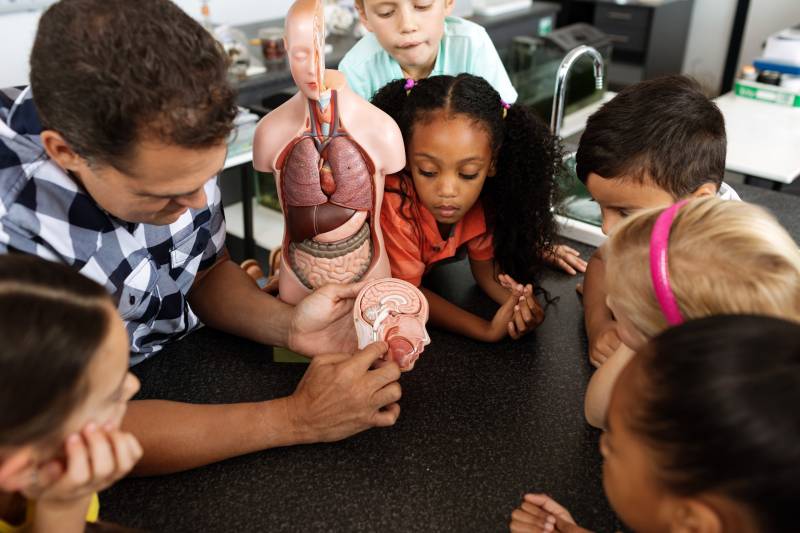
As a parent, it’s never too early to consider the right nutrients for your child’s brain development. By the time your child is three years old, the structural and intellectual capacity is mostly established. In fact, the brain’s framework is developed while your child is still an infant.
What Affects Brain Development
Healthy brain development starts about midway through gestation and continues into the early childhood years. Your child’s brain health influences his learning, focus, impulse control, planning, and decision-making processes. It also plays a key role in social and emotional skills, as well as mental and mood health.
Although babies aren’t yet reading or talking, they are constantly learning by observing their environment and connecting with their caregivers. These early learning processes continue into the toddler years as the child learns about speaking and social skills through play and interaction.
In fact, a child’s decision-making and learning skills are established in early childhood. Growth and development of the brain continue into the teen years, but the focus shifts. The brain begins to trim itself by removing underutilized information pathways and neurons to allow space for others to flourish.
Many things can affect your child’s brain development, but most experts agree that these three areas are the most influential: nutrition, experiences, and exposure. Exposure to things like toxins, infections, viruses, trauma, and stress can be detrimental to brain development over the long term.
On a similar note, positive and negative experiences can have lasting positive or negative effects. Abuse and neglect can be devastating, while positive play and reading with your child support healthy brain development.
In this article, we’re going to take a deeper look at the third key. What role do the right nutrients play in a child’s brain development?

The Right Nutrients for Healthy Brain Development
Your baby requires certain raw materials for optimal growth and normal, healthy brain development. Protein, fat, vitamins, minerals, and micronutrients like omega-3 fatty acids are all essential.
The goal is to ensure that these nutritional needs are met. Young brains can be heavily impacted by nutritional deficiencies. Much more so than older, fully developed brains. In fact, nutrient deficiencies in the infant and toddler years can negatively impact developing brain structure, function, and cognitive abilities later in life.
Multivitamins for babies that are organic can help to ensure that there are no nutritional gaps that could affect your baby’s brain development. Into the toddler years, much of your child’s nutrition should come from nutrient-dense, whole foods, but an organic multivitamin should still be provided as a safeguard against nutritional deficiencies.
That’s not to say that the brain can’t recover from most nutritional deficits. But there are certain critical times when the right nutrients in the right amounts are especially crucial, and deficiencies could be more damaging.
Important Nutrients for the Developing Brain
- Protein - Protein is a macronutrient that provides amino acids, which are necessary for all growth processes, including healthy brain development. Protein is a key component of neurons in the brain, as well as neurotransmitters, which pass messages between the organs and brain. Protein is also a key material used to build the structure of the developing brain. Insufficient protein intake during the first three years of life could lead to poor brain growth and have a negative impact on your child’s neurodevelopment.
- DHA - Most people don’t realize that half of the brain is made from fat. Healthy fats are essential for brain function and neurological development in babies and young children. Deficiencies could even lead to poor cognitive function later in life.DHA, or docosahexaenoic acid, is an omega-3 fatty acid found in the brain. It is required for the creation, organization, and connection of neurons in the brain, as well as building the structure of the retina in the eye.
- DHA intake can affect vision, attention span, impulse control, and even intelligence later in life. The best food source of DHA is fatty fish, which most babies and children aren’t big fans of. The importance of providing an organic multivitamin that includes DHA can’t be overstated, especially in the first three years of life.
- Zinc - Zinc is a mineral that the brain requires for most functions. Zinc deficiencies during pregnancy and in the first three years could lead to poor memory, a short attention span, slow learning, and mood issues. Whole grains, nuts, shellfish, beans, and meat are good sources of iron, as well as daily multivitamins.
- Iron - Normal brain anatomy requires iron. It is also necessary for the process of myelination, which promotes the efficient transmission of information in the brain. Neurotransmitters that regulate functions like breathing, heart rate, learning, and concentration also require iron. Iron is commonly found in meat, spinach, beans, and enriched breakfast cereals. Iron deficiency is most common in plant-based diets, but you should consult with your pediatrician to see if he recommends an iron supplement for your baby or toddler.
- Choline - Our bodies can’t produce choline, so it must come from the diet or supplements. It is necessary for healthy brain cell structure, memory processing and storage, and neurotransmission. Adequate intake of choline during pregnancy may also help to prevent neural tube birth defects. Choline can be found in egg yolks, meat, and some nuts. It should also be included in the child’s daily multivitamin to ensure adequate intake.
Key Takeaways:
How to Support Your Child’s Healthy Brain Development
How to Support Your Child’s Healthy Brain Development
Your child’s brain begins to develop about midway through gestation, so choosing a nutritious whole food diet and taking your prenatal vitamins while you’re pregnant is crucial. If possible, breastfeed your baby and continue to eat a healthy diet that’s rich in the nutrients mentioned above. It’s also a good idea to continue taking your prenatal vitamin for as long as you are breastfeeding.
If your baby is on formula, be sure that it is fortified with DHA and iron. At around six months, begin incorporating nutritious, whole foods into your baby’s diet. The need for iron and zinc increases around this time.
Toddlers are known for being picky eaters, so focus on nutritious meals and snacks along with providing a daily vitamin. Avoid offering sweets and empty carbohydrates that can crowd out nutrients necessary for healthy brain development.
As your child moves out of the toddler years, encourage a varied diet of whole foods to ensure that your child is getting the nutrients required for optimal cognitive function.
Wrapping Things Up
All nutrients are important for healthy brain function, but the ones mentioned here are especially important for early brain development. Prioritizing these nutrients during pregnancy, lactation, and throughout the first three years is crucial for ensuring your child’s healthy brain development and overall brain health in the future.

Did you know that certain foods can cause learning struggles?
You'll also learn how to:
- Learn what foods can damage your child's brain
- And learn which foods enhance mental ability
- Get our free cookbook
You can get the cookbook for free. Just Click here.









